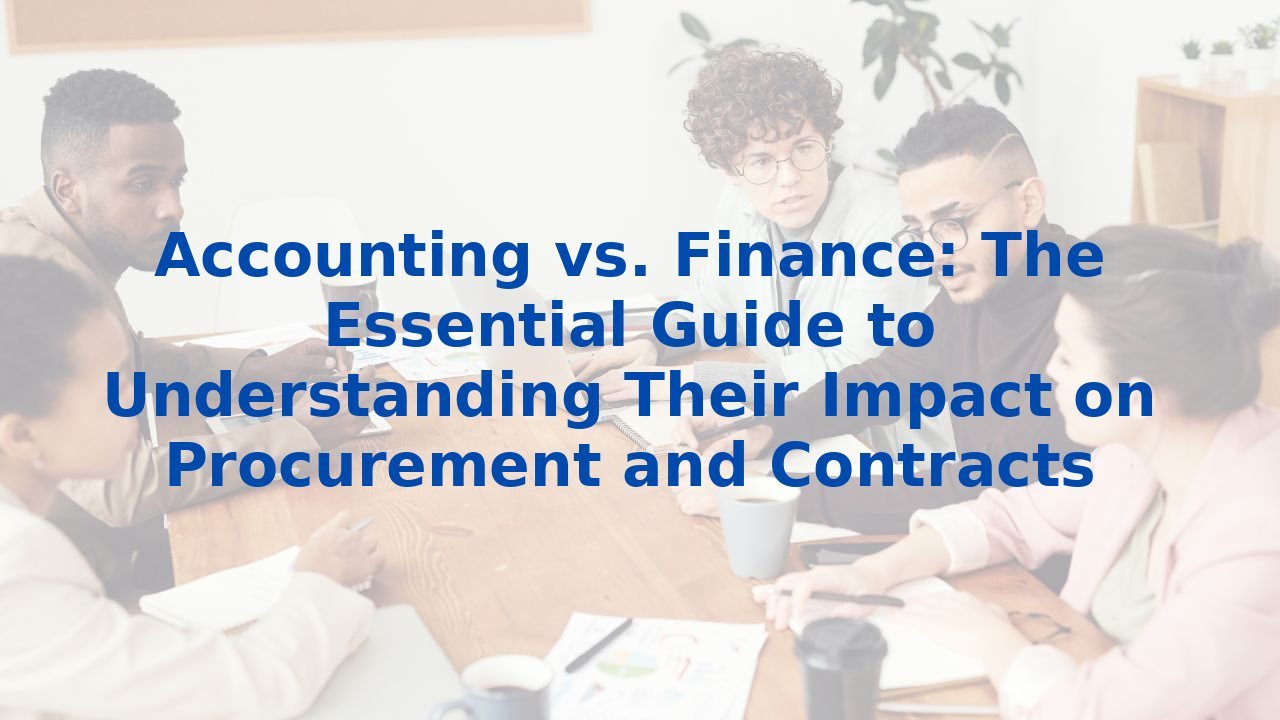Accounting vs. Finance: The Essential Guide to Understanding Their Impact on Procurement and Contracts
Understanding the Distinction: Accounting vs. Finance
In the vast world of business, the terms accounting and finance are often intertwined, yet they delineate two distinct realms. Accounting focuses on recording, summarizing, and reporting financial transactions, while finance expounds upon managing assets and liabilities, forecasting future financial performance, and strategizing for growth. Both disciplines play pivotal roles in procurement and contracts, offering unique insights that can shape business decisions and strategies.
The Impact of Accounting on Procurement
Accounting provides a foundational overview of a company's financial health. It aids in assessing overall costs associated with procurement, ensuring that every purchase aligns with budget constraints and strategic goals. Accurate accounting systems lead to better visibility into expenses, enabling organizations to manage their cash flow effectively.
“Insightful financial data from accounting facilitates better decision-making in procurement.”
The result? A streamlined procurement process where decisions are not only data-backed but also aligned with long-term financial objectives. By leveraging advanced analytics, procurement teams can identify trends in spending, negotiate better contracts, and make informed purchasing decisions.
The Role of Finance in Contract Management
On the flip side, finance injects a forward-looking approach into contract management. It's about understanding the implications of contracts on future cash flows, profitability, and overall business objectives. Financial modeling, often rooted in forecasting and valuation techniques, allows businesses to ascertain the viability of contract terms and conditions before committing resources.
“Finance equips businesses with the foresight needed to navigate complex contract landscapes.”
This proactive stance empowers organizations to negotiate terms that optimize financial outcomes. It emphasizes risk management, ensuring that every contract is scrutinized through a financial lens that aligns with overarching goals.
The Symbiotic Relationship Between Accounting, Finance, and AI
While accounting and finance each have their domains, the integration of Artificial Intelligence (AI) into these processes revolutionizes how businesses operate. AI doesn’t simply enhance efficiency; it transforms the way organizations interact with their financial data.
Enhancing Efficiency through AI
By automating repetitive tasks like data entry and invoice processing, AI liberates valuable time for finance and accounting professionals, allowing them to focus on strategic activities that drive value. This level of efficiency can significantly reduce operational costs and enhance productivity, enabling teams to redirect their efforts toward value-added activities.
“The beauty of AI lies in its ability to elevate human decision-making.”
Moreover, AI tools can analyze vast datasets to uncover insights that humans might overlook. For procurement, this means optimization in sourcing strategies based on historical spending patterns. For contract management, it translates to risk assessments powered by predictive analytics, ensuring businesses are informed of potential pitfalls before they arise.
Empowering Employees with AI Training
To fully harness the potential of AI, training employees becomes paramount. Investing in AI training empowers teams to adapt and thrive in an AI-enhanced landscape. Employees equipped with AI skills become pivotal players in leveraging technology for better insights, efficiency, and innovation. They emerge as champions of change, driving transformation within their departments and the broader organization.
Conclusion: The Future is an Integrated Approach
In navigating the intricate dynamics of accounting and finance within procurement and contracts, understanding the interplay between these two disciplines is essential. With the augmentation of AI, organizations can unlock unprecedented efficiencies that streamline operations and foster strategic decision-making.
The journey doesn’t end here; training your workforce to adapt to these technologies will determine the pace at which your organization evolves. By equipping employees with the necessary tools and knowledge, they become instrumental in embracing the future of work—one where AI and human expertise coexist for unparalleled success.
As we stand on the brink of an AI-driven age, the question remains: Is your organization ready to embrace this transformative journey?



